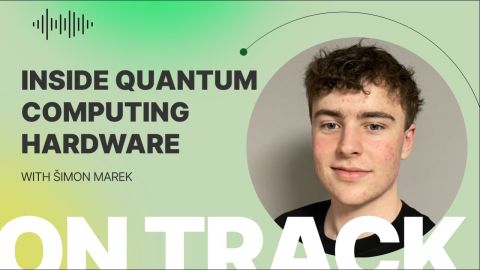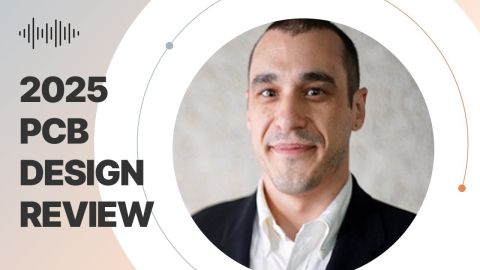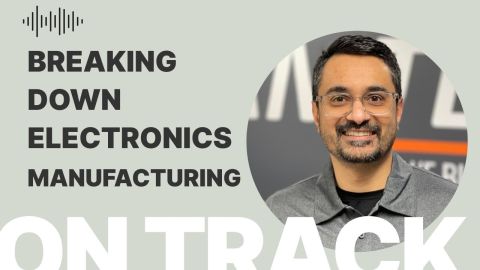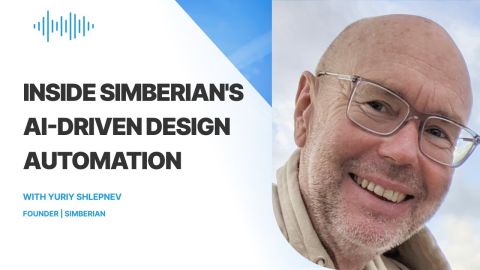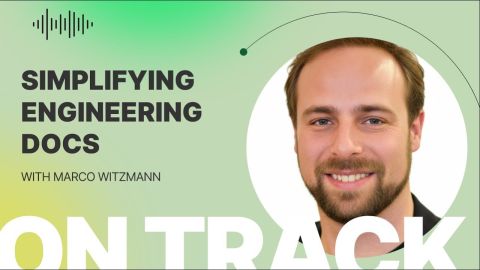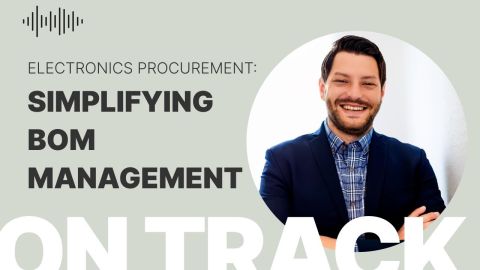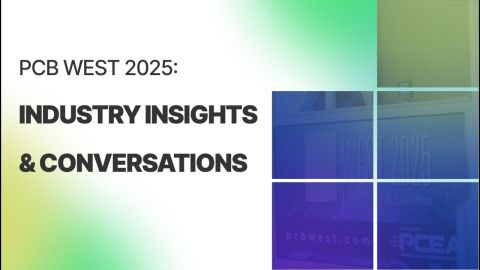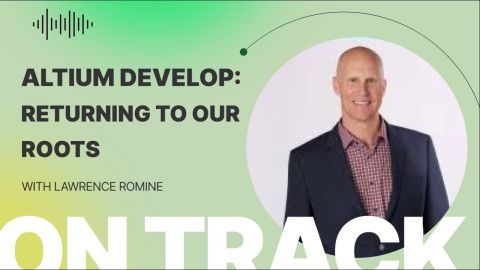IPC CEO John Mitchell on the Supporting American Printed Circuit Boards Act

Supply chain security and having access to trusted manufacturers in the US would be an ideal outcome of the Printed Circuit Board Act.
IPC President and CEO John Michell talk about how the organization helps shape the current bipartisan proposal to help bring back PCB manufacturing in the US and how this can contribute to a globally resilient supply chain.
Listen to the Podcast:
Download this episode (right click and save)
Watch the video:
Show Highlights:
- John Mitchell briefly talks about his background and dives right into the topic, the Supporting American Printed Circuit Boards Act
- John emphasizes the role of the IPC as the voice of the electronics industry
- Supply chain security and having more trusted PCB manufacturers in the US would be a great outcome of the Printed Circuit Board Act
- Adapting the existing legislation on manufacturing defense products to broader use, especially with electronics
- Raise awareness of the different aspects of the electronics supply chain shortages and other issues related to it
- Eradicate the notion that PCBs are just a piece of plastic, but an essential piece in every electronic
- The IPC's influence on shaping laws relating to the electronics
- John explains IPC's role and involvement, which includes solving industry problems related, but not limited to, the workforce, supply chain, and advanced packaging issues
- The IPC SEA Tools: Standards, Education, and Advocacy
- John stresses that having manufacturers in different regions is a key to a resilient supply chain
- Identify what electronic products to manufacture where
- The Printed Circuit Board is a 60 billion industry globally, and only 3-5% of volume comes from the US
- John explains the impact of the changing administrations in the US on the current progression of different bills and legislations relating to the electronic industry
Links and Resources:
Connect with John Mitchell on LinkedIn
Visit the IPC website here
Learn more about the Supporting American Printed Circuit Boards Act of 2022
Watch John Mitchell’s previous episodes:
- IPC CEO John Mitchell on the Impact of COVID-19 on the Electronics Supply Chain
- John Mitchell, CEO of IPC, Visits The White House to Participate in the Pledge to America’s Workers
Watch a recent related episode: The Benefits of Diversifying PCB Industry Supply Chain
Connect with Zach on LinkedIn
Full OnTrack Podcast Library
Altium Website
Claim the special offer for Podcast listeners only
Transcript:
Zach Peterson: I haven't heard anybody say anything about printed circuit board shortage, if it's-
John Mitchell: Coming to you on the nightly news. Yeah. You don't hear that very often, right?
Zach Peterson: Yeah, exactly.
Zach Peterson: Hello everyone, and welcome to the Altium OnTrack podcast. I am Zach Peterson and I'm very happy to be here today speaking with Dr. John Mitchell, president and CEO of IPC. Given some recent legislation, I thought it was very pertinent to talk to John and I think it's going to be a very interesting discussion. John, thank you so much for being here with us. And you've actually been on the podcast before. And so anyone who's interested, we'll link in the show notes some of those older episodes. But definitely thank you for being here with us today.
John Mitchell: Thanks for having me, Zach.
Zach Peterson: Absolutely. So, as I had mentioned in the intro, there is some recent legislation that I think folks in the industry should be aware of. But one thing I wanted to just briefly ask you was maybe a little bit about your background and how you got involved in IPC.
John Mitchell: Wow. I don't think the podcast is that long. So-
Zach Peterson: Briefly. Just briefly.
John Mitchell: Briefly, high level. Electrical engineering. Used to be in aerospace and automotive designing cool stuff. Got a business degree and started moving into management of various companies. Also played in he world of Bose. So, General Electric, Bose, Alpine is where I worked. And then I did a little stint in nonprofit, which opened my eyes to what we can do on the nonprofit side. And then along cane IPC, which is kind of like the juxtaposition of everything I've ever done in my career, from the electrical engineering to my doctorate in education to management and business and nonprofit, and it all came together. And so I've been here at IPC now for just over 10 years and it feels like it's been two, because there's just so much good work for us to do. How was that for a quick brief synopsis of my entire life?
Zach Peterson: That was very interesting actually, because I never would've thought of IPC as being that intersection between what you said about nonprofits versus electrical engineering, but I guess you're right. Yeah. It is that perfect intersection for someone like yourself.
John Mitchell: Yeah. So, it touches it all from engineering to education. The real thing that it brought new is what we're going to talk about today, is on the advocacy front. Government relations. As an engineer you always sit there and go, "Man, that government stuff just gets in the way of doing good things," but there's also a benefit to it. It can help us as well and open some doors, which is good.
Zach Peterson: Yeah. My view on the role of government has evolved and shifted as I've gotten older. And I think you've hit on a good point, is that there are things government can do to maybe create incentives and set parameters within an industry that drive how it operates. And I think some of this recent legislation is a good example of that.
John Mitchell: Well, and we're very excited. I mean, we've been working with the government for the entire tenure that I've been here, 10 years that I've been here, my tenure and the 10 years, it works well. So, this most recent legislation that you're referring to, the Printed Circuit Board Act here that is being co-sponsored by a couple of legislators out of California and Utah. And we had them actually with industry leaders on our own little industry forum and had a couple of the aides talking specifically about what they're trying to do in terms of giving tax breaks to motivate the purchase of localized or US-based printed circuit boards. And that's a great thing. It was interesting though. One of the things that I've come to learn in getting more engaged in advocacy is just because you have something come up doesn't mean that it's necessarily going to pass in the form you described it, right?
John Mitchell: There's two Houses of Congress. There's back and forth. And you never know where it's going to come. But the great thing about this is we're catching the attention of the members of Congress. And they're recognizing that this is a real issue that in this area, in North America, specifically in the United States, needs to be worked on. And so that is, to me, the number one boon of this bill. And as it progresses, I think we'll see what pieces of it stick and where it sticks, right? So, right now it's a great first step.
John Mitchell: And we're looking for the industry at large to support it because it's saying that if you're not talking to your local Congress folks and saying, "This is important to my job, to what I can do," then without hearing that they're not going to recognize that it is important to their district as well, wherever they may be. This isn't just a Utah and California bill. This is actually something that's helping the entire printed circuit board industry across the country. And so, that's important. And as you get more and more voice... IPC is working to bring the voice of the industry, as we have and continue to do. What's great is then-
Automated Voice: I'm sorry. Could you say that-
John Mitchell: >... you get... Sorry, my watch, Siri, just apparently heard something from me and I don't know what it was. So, I don't know. We can take it out and edit. I don't know. So, what we need to do is have folks who are in the industry talking to their local Congressman and saying, "This is an important thing. And it's important to us, not just in Utah and California, but it's important across the board." And as we do that, then whatever form it takes, whether it gets adjusted as the two Congresses come together or whether it finds its way into the National Defense Authorization Act in different pieces, the important point is they're starting to pay attention. And we've been talking about this literally for 20 years. We've been working with government trying to raise the alarm, saying, "Guys, there's a problem." And this is an opportunity to do it at a congressional level as well. Did I go on too long about that? I don't know. What questions do you have?
Zach Peterson: No. It's, well, I mean, as any piece of legislation, I'm sure the bill is expansive and detailed, so I'm sure there was a lot of moving pieces. But you brought up something interesting here, which was the NDAA or the National Defense Authorization Act, you know?
John Mitchell: Yeah.
Zach Peterson: The recent legislation around printed circuit boards as far as I know has not been standalone. It has always been something piecemeal addressing something targeted that has been incorporated into the NDAA. And I think when people think about supply chain security and preventing IP exposure, especially at the packaging level with electronics, they usually gravitate towards defense. I think it makes sense.
John Mitchell: Sure.
Zach Peterson: That's the type of thing that any country, not just the US, but really any country would not want to expose that type of intellectual property. And so it makes sense that there are these provisions to try and limit that exposure and maybe keep all of that domestic and that manufacturing capacity domestic.
John Mitchell: Yeah. And it's interesting you say that. I think it's the first thought of where supply chain security and having trusted sources comes up. But increasingly, over the last few years especially, there's an understanding in industry that this may need to go to every aspect and every segment of industry. It's not just a defense thing anymore. It'll probably start there. But as we found with all these supply chain challenges, the better you can secure and establish trust throughout those supply chains, the stronger those supply chains will be. And that applies to every product. It's not just defense. And that will help improve. And so that's why IPC works on standards that help transfer that kind of information. And yeah, most the people implementing those standards are largely looking at defense right now, but we're looking at adapting them to be for broader use.
Zach Peterson: So, speaking of broader use, I'd like to maybe make a comparison to what's happening with semiconductors. Because anybody who has watched the nightly news over the past year and a half knows that what's the one shortage that keeps hitting the nightly news? It's automotive. And then of course all the chips that go into it and that's where it starts. But then I think more broadly it's just generally known that there is a chip shortage. And I get asked questions, "Oh, are you having trouble getting chips," just because people know that I do design. And of course it's like, "Yeah, it's like pulling your hair out sometimes." And so that's what hits the news. And I know that legislators are often very responsive to that type of pressure from the media. I haven't heard anybody say anything about printed circuit board shortage, if it's-
John Mitchell: Coming to you on the nightly news. Yeah. You don't hear that very often, right?
Zach Peterson: Yeah, exactly. So, clearly it's not a shortage necessarily in the same way as semiconductors that's driving this. And so I'm wondering what is driving the momentum? Is it just this idea that, "Hey, each time you send an assembly overseas there's risks of IP security or you lose control or the costs just mount up due to shipping back and forth? What are the points that legislators respond to?
John Mitchell: So, there's as, with anything, there's no real simple answer, right? If there was, we would've solved it. And so yeah, you know how media works. Being in media, right? This is media. So, most media tries to simplify a situation. So, right now the supply chain shortage to the common man is a semiconductor issue. And that's all they see. Well, that's not all it is. There are 100 different aspects of the supply chain problem. There's transportation issues. There's tariff issues. There's still COVID impacts that are happening in different parts of the world that are driving all kinds of supply chain issues. But if you were to go through the news and try to analyze that, people glaze over, right? And so they pick on the one thing. Okay, it's semiconductors. And that is an issue. It's not that it's not an issue.
John Mitchell: But the issues behind the Printed Circuit Board Act that we're talking about are supply chain related. They are security related in terms of IP. They are about speeding up things. So, there's a lot of different aspects that go into this. And when you craft a bill, like you said, legislators pay attention to certain things. I always think about, I don't know if you guys remember Conjunction Junction, the Schoolhouse Rock, where they taught us how the government works with the, "I'm a bill." But-
Zach Peterson: I remember it vividly.
John Mitchell: Yeah. So, there was a school bus accident where some children were harmed, killed, and that got legislation moving very quickly. Economic issues that cause voters in their districts to cause them pain, lose jobs, not be able to get the things that they need, that gets people to move quickly. And so there's strategy to politics as well, in terms of what are we going to actually focus on? What are the hot buttons we're going to push and how do things flow through the system? And so there's a lot of that enters into it. I'm not saying it's perfect or that it's bad or anything. I'm just saying it is what it is. And so you need to know how to play the game. It's like playing basketball.
John Mitchell: If you don't know the rules and you walk on and you just pick up the ball and walk to the other side and then put the ball up there, they say, "Hey, you can't do that. You got to dribble." But politics is the same way. There's ways for it to work. And some of those ways are evolving with just a lot of ingrained bipartisanship, but one area where bipartisanship doesn't seem to be as ingrained is on supply chain issues. And so that's a good spot to start. It's where we might actually get some action there. And we're excited about getting some movement on this bill, as well as any other pieces that might adopt it or adapt it as it goes forward.
Zach Peterson: So, to what extent-
John Mitchell: Did I answer your question?
Zach Peterson: Yes. In a way, yes. What I'm wondering is this. I think this relates a little more broadly to the role of IPC and then some other organizations that I know have argued for legislation like this. What is the IPC's role in influencing how legislation like this might be crafted? Is it-
John Mitchell: Yeah. So-
Zach Peterson: Is it as a lobbying organization in the traditional sense?
John Mitchell: So, we do lobbying officially. We've worked directly with both of these Congressman's office, Congresspeople, person's offices, as it was crafted, even before it saw the light of day. And so we've been heavily involved, which has been great. And then as it starts to see the light of day, we've been instrumental in pulling other organizations into it as well. Because it's not just the more voices that are heard the better. And so we're pleased to see other organizations picking up the flag and saying, "Yeah, this is a great thing too."
Zach Peterson: Okay. Okay. I ask because I think most people see IPC and then they want to put four numbers after it citing some kind of technical standard and they maybe don't see what the IPC also does in terms of lobbying as we've been talking about, but then also education.
John Mitchell: Yeah. I mean, basically we sit on primarily three pillars. Standards we've been doing for 65 years, which is why that's the default. Everybody sits there and goes, "Oh, it's the IPC standard." Education we've been doing for 30 years. We certify over 100,00 people every year. We provide training and skills training now that we've been developing with hundreds of industry companies. So, again, we follow the same pattern that we do with our standards. IPC doesn't create standards. The industry creates standards. IPC shepherds the process. IPC doesn't create education programs. The industry creates the programs and IPC leverages their instructional designers using the latest education science to make sure it's something you'll remember. And then we distribute it and get it out there. We don't come up with the bills.
John Mitchell: We have committees of industry players that say, "Hey, these are the top issues. IPC, go off and work with IPC's lobbyists," and our lobbying teams that we work with, contracted both in North America as well as in Europe. And we also do the same kind of things in Asia. We do on behalf of the industry. We try to solve their problems. That's what we are about. So, right now, what are the top issues that we hear from industry? Their workforce. There are things like the supply chain. They are advanced packaging issues.
John Mitchell: And so IPC is at the forefront of trying to solve that with those three tools: through standards, through education and through advocacy. I love that people know us as a standards organization. That's great. I love that they recognize that we are the leading entity in electronics training across the globe. That's awesome. But they don't see that. That's not the first thing that comes off their mind. I wish it was right there. They're like, "Oh." Because we came up with a great acronym, S-E-A, SEA. Standards, Education, Advocacy. That's what we do. And that's how we solve the big problems of the industry globally.
Zach Peterson: Right. Right. And from a global perspective, I think it's important to ask. Because you and I are in the US and so we tend to talk about things from the US perspective. But I'm wondering, is there this same kind of onshoring or nearshoring type of push in other countries?
John Mitchell: So, yeah. So, there's been a shift over the last, I'd say, four years from a view of being global and the globalization of the supply chain to a more regionalization. And it's more making sure that I have a resilient supply chain. It's not that global supply has gone away and I don't think it ever will go away, but you want to make sure in times of crisis. I mean, we had the whole COVID pandemic thing that caused issues. Now we have a war going on between Ukraine and Russia that's also causing issues. So, having a resilient supply chain and having that regionally is important. So, people are localizing specific areas. So, in the US and Europe, yeah, semiconductors, advanced packaging and certain types of capability, they're trying to make sure that they have the capacity to do what they need to do.
John Mitchell: Does that mean they're not going to use sources anywhere? No, it doesn't mean that. It just means that, "Hey, I've got to figure out the right way to do things." Because I don't expect the entire supply chain to exist in Europe, the entire supply chain to exist in North America, and the entire supply chain exists in Asia. I don't expect that at all. I expect there to be pieces of it in those places and key pieces of it. But there'll be other aspects that it just doesn't make any economic sense to try to do that as you go forward. So, you'll have other mechanisms to utilize parts that might be available and other parts to create that resiliency.
Zach Peterson: Sure. Now, you talk about regionalization. And this is something that I've thought about and also talked about myself in terms of, what is the right number? What is the right market share for North America, let's say? Because currently I think production capacity as a fraction of total capacity in the US is... It's a single digit number, I think, right? Like 4% or something?
John Mitchell: For printed circuit boards specifically, yeah. I'll just use round numbers. Of a 60 billion global industry, the US produces on dollar value something like 4 or 5%. And most of that's defense.
Zach Peterson: Sure, sure. Yeah.
John Mitchell: So, if you go to volume, the number actually gets smaller because defense pays more for that. And so the dollar value is higher.
Zach Peterson: Okay. Okay. So, okay. So, the actual, let's say, the actual number of-
John Mitchell: It might be 3% of volume.
Zach Peterson: Okay. So, the actual number of orders or some other metric is actually going to be smaller than just looking at the dollar value because of the value-add in an area like defense and aerospace.
John Mitchell: Right. And it's not terribly different in Europe. It's around that, again, that single digit 5%-ish, if you go. Almost all of the printed circuit boards in the world are developed in Asia.
Zach Peterson: Sure. So, I think it's fair to ask and maybe play devil's advocate a little bit and mention that, okay, you're producing a lot of defense products domestically. That's fine. So, what else needs to be produced locally? Why not let every toaster oven or every circuit board for a toaster oven or microwave be produced overseas? Are you actually arguing that they need to be produced in North America or in Europe or close to the end customer? Where do you draw the line? Because I think that's more important than putting an arbitrary number up there and saying, "Well, okay, the industry is 60 billion. We need to produce 6 billion of it in North America," let's say.
John Mitchell: Yeah. I don't think the discussion has gone around how much. But one of the big challenges around this discussion is, "Okay, if we're going to build certain types of expertise in this country..." So, defense is a quick one. Right now there's a lot of focus, as you mentioned, on semiconductors. And the advanced version of PCBs is advanced packaging. IC substrate, OSAT type of capability. And that's really lacking in this country. And part of the debate around that area is, "Okay, if we're going to build semiconductors here, are we actually lengthening the supply chain?" Because if we don't have IC substrate and OSAT capabilities here for those kinds of products, you build the chips here, you're going to ship them somewhere else so you can utilize that, put them on a board and then ship them back. So, you actually made the supply chain longer.
John Mitchell: And to go build that capacity for those things, if I want to build a state of the art IC substrate facility here in North America, in the US or in Europe or wherever, you need to make sure there's a business that's going to sustain it. So, will the semiconductors actually use that one? I don't know. So, there are all kinds of questions about this. This is not easy stuff. This is why it doesn't happen overnight. You're trying to build the right controls. What are the right product lines that should be built in whatever region you're talking about? And that's a very challenging discussion. There's economic factors. There's government factors. There's pride factors. There's all kinds of things that come into it. And time will tell. What we try to do at IPC is advocate for the industry. And so that's why we listen heavily to the industry. We don't sit there and tell the government what the right answer is before we check with industry. Industry is who guides IPC's voice. Because we are the voice of industry.
Zach Peterson: I see what you're saying. And I think when you talk about the entire industry and you talk about the entire supply chain holistically, it seems more like the focus is on greater investment generally, and maybe let the market work out what the right mix of IC substrate domestic manufacturing is, or work out what the best number of printed circuit board manufacturing facility growth is.
John Mitchell: Maybe. Maybe. I think there needs to be some guidance there as well. In a pure world, right? The economist world where they sit there and say, "Oh, well, market forces will sort that all out." It was kind of there. But then we find countries inserting themselves and saying, "Well, actually, this group said that this is important to us. So, we're going to put a tariff on that." Well, that kind of screws up the free market a little bit. And people go, "Wait, this is not a competitive advantage. All of this stuff is being built in Taiwan or in China or somewhere else that's not here. We're going to lose jobs."
John Mitchell: Well, suddenly there's a national imperative to that. Or there may say, "We want to own this thing." So, there are so many factors. So, just saying that we need to let the free market prevail is nice, but the free market doesn't really operate as a free market. There's a lot of cooks in the kitchen, people stirring the pot to try to make it go their way. And because of that, I don't think you can just let it go. But you need to decide what games you want to play or what avenues you want to make a difference for your particular country or region.
Zach Peterson: Okay. So, then there really is a mix of considerations beyond just what's the right number of facilities, what's the right market show, what's the-
John Mitchell: Yeah. And there's also, like I said, right now we have basically a lot of fab companies, but we don't have a lot of IC substrate companies. There's capability here. Now, is it the latest greatest for the future? Maybe. Maybe not. But they're going to go jump potentially billions of dollars in that. It'd be nice if they put a few billion dollars also aside for the rest of the industry so you can actually support it. And that's part of what we advocate for on the rest of the supply chain. Instead of just the semiconductors, which we think is a great thing. We think that investment is wonderful. Just don't forget about the rest of the ecosystem, which is what we've been preaching for 10 years. There is an ecosystem to be considered, not just a specific one thing that hits the top of mind to the general user of electronics.
John Mitchell: It was interesting. One of the aides that was speaking with us said, "Two years ago, I didn't even know what a semiconductor was." And so for most people, their phone, they don't think that there's a printed board in there. They don't think that there's assembly that has to take place. They don't think that that silicon actually has to sit on top of an IC substrate and gets assembled into its own sub-assembly and then added to a board, et cetera. They don't know any of that, okay? All they think about is, "Does my app work?"
Zach Peterson: Well, and speaking of someone's phone-
John Mitchell: And, "Can I get my device?"
Zach Peterson: Yeah, yeah. Exactly.
John Mitchell: >"I still can't get my PlayStation 5. It's killing me. It's been a year and a half."
Zach Peterson: Yeah. I'm sure many major purchases have been put off because of that. But I think there's just this more perception more broadly about those green pieces of plastic that get put into different devices. Maybe somebody pulled apart their toaster oven one day and saw, "Oh, there's a circuit board in there."
John Mitchell: Yeah. Cool.
Zach Peterson: >"That's cool." Right? But I think what most people-
John Mitchell: That might have been the last time, or it might have sent them on a path to become an engineer. Either one. You just don't know.
Zach Peterson: I hope the latter.
John Mitchell: But I will tell you. So, 10 years ago, when I first started this job, we were working on trying to get some modifications to the US understanding that printed circuit boards... The thought was, "It's a cheap piece of plastic. We can buy that from China. It doesn't need to be secured." And we actually fought for a long time to get that actually written in as it is a protected IP device. That was one of the first advocacy efforts that I was involved in here at IPC. That was only 10 years ago. And that was for the government, okay? And they didn't get that this... "Oh, well," and there was argument. It wasn't like a, "Oh, we had a friendly discussion," and they got it. This went on for weeks and months before it finally got written in.
Zach Peterson: I will be honest. 10 years ago when I was still a graduate student, it's not that long ago, but I had finished my master's and when I did my master's, I had done a very simple PCB and then I never touched the things until actually working in industry. But I was doing research in optics and semiconductors. And I always had this perception that it was just an overblown way to connect chips together. And I had no idea of the engineering that goes into it, and a lot of my students didn't either. So many students wanted to go work at Intel because here in Portland, I was teaching at Portland State, but we have a big Intel campus and Intel was on campus a lot recruiting and everything.
John Mitchell: Yeah. When I did my double E that's where I was headed to. I did my BLSI design course. We were going. Semiconductors was the hip and cool stuff, man.
Zach Peterson: Yeah. Yeah. And I mean, at the time the discussion was so much about Moore's law is going to come to an end and what's going to be the next thing that gets you to the next hump. And so many people want to put their effort and their mind towards solving that problem. And so I think it's understandable that for a long time engineers gravitated in that direction and there was all that focus. So, it's really refreshing to see that people are coming around to understanding the role of the PCB, not just as an engineered product but also for these other issues that we've been talking about, for supply chain security, things like this.
John Mitchell: The thing that woke me up to that was... So, I was working at Alpine and Alpine is largely known as a sound company, right?
Zach Peterson: Mm-hmm.
John Mitchell: And we had these guys laying out amplifier boards and the curve of the run would provide noise. And now think about it in terms of high speed. If in audio things that is generating noise to a speaker coil, imagine what it's doing now that we're running at gigahertz, right? And the kind of noise that's being generated in there. So, as we smaller and faster, heat is critical. Connections, super critical. I mean, just because you have the coolest semiconductor in the world, you plop it down in a board and there's a chance it might not work because it wasn't designed right. And so having people that are properly educated in how to design a board to work with certain types of high speed electronics, et cetera, is critical to electronics working, especially as we move into the future.
John Mitchell: And so I just see a bright future for the printed circuit board industry. And it's a high tech future. This is a future where we're using the latest, greatest tools. We're looking at doing additive technology on boards now, as opposed to just in semiconductors or additive and subtractive. So, we're using both here. The designs that you're having to consider are the same kinds of considerations as these runs get tighter and smaller that used to be the things that only semiconductors would think about. And so determining whether the future can actually work or not.
Zach Peterson: So, I think the last question I might have is around the momentum and how to maintain it. Because if you look at the dollar amounts in the CHIPS Act and the FAB Act and anything supporting semiconductors, they're in order of magnitude larger than what is in the Supporting Printed Circuit Boards Act. So, clearly this is not going to just be a one and done thing for the printed circuit board industry. How do you maintain that momentum? Do we just keep the conversation going? Is it just a repeated push by lobbyists? What has to happen?
John Mitchell: So, every country is different, okay? One of the challenges that the US specifically has on this front is that the leadership of government changes so often. There is no US strategic plan, okay? There isn't one. And while we may have this CHIPS Act today, you could have elections change and they could see a lot of it either blow up or get thrown away with the next group of leadership. That's a challenge in this country. Whereas you have other companies in Asia, why many board companies and other companies have gone to Singapore, China, Taiwan, wherever, is because they'll give them a 10 year plan and they follow it. And so they're like, "Wow, I can invest in here with security." The government involvement in this can be a boon, but it's also a risk because things are constantly changing in this country.
John Mitchell: >"Hey, we've got this tax break." "Great." Next year it went away. What the heck? How do you make a business plan on that? So, there's a lot of challenges to that. So, what do we need to do? We need to continue to have a voice. And what IPC does on its DC front of advocacy is, we play with the cards that were dealt. We did different things with the Trump administration, different things with the Obama administration, different things with the Biden administration in order to try to... Our boss, our leader, is the electronics industry. We're trying to make sure that one succeeds because that's the long-term play and it's not a four year horizon.
Zach Peterson: I totally agree with you. And I think we're going to have to leave it there because we're running a little low on time, but it's definitely an inspiring message. And I hope to-
John Mitchell: Zach, I hope I answered your questions and gave people a little flavor of some of the complexities and challenges that we work on. But thank you for the opportunity to share. Hey, we even got to touch on standards as well as our education as well as advocacy today. So, awesome. We hit them all.
Zach Peterson: Absolutely. And we'd love to have you back in the future to discuss some of those other issues.
John Mitchell: Happy to.
Zach Peterson: Great. That's great to hear. Well, thank you so much, John, for joining us. This has been a really insightful discussion. And to everybody that's out there watching on YouTube, make sure to hit the Like button. Hit the Subscribe button to see future episodes, and check out the links in the show notes to go learn more about this new legislation and to learn more about IPC. Dr. Mitchell-
John Mitchell: And get involved.
Zach Peterson: Yes. Get involved. Absolutely. Get involved. It rests on you to get involved, the viewer. Thank you so much again, John. And to everybody out there watching, don't stop learning, stay on track, and we'll see you next time.

